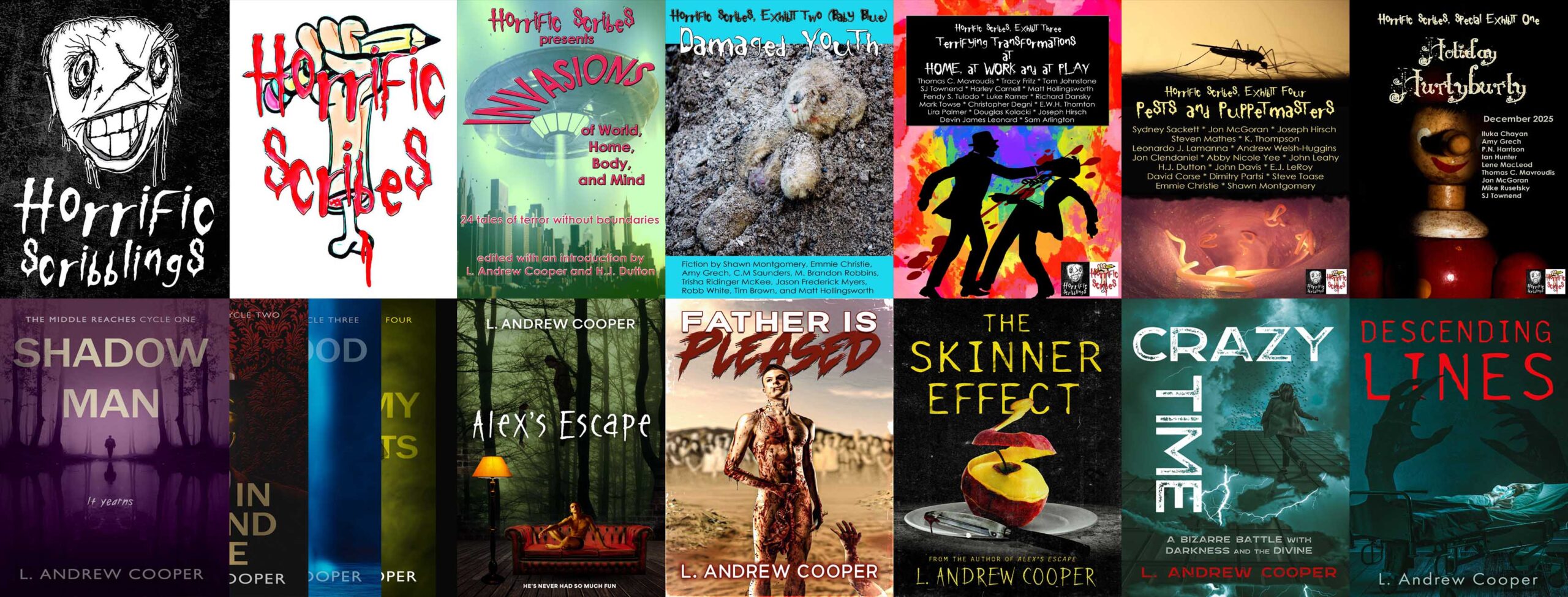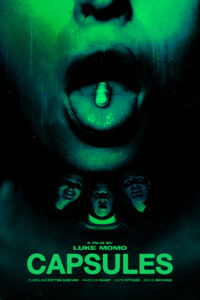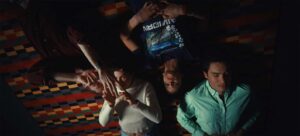Director/producer/writer/editor Luke Momo has kindly agreed to share insights about his thoughtful, innovative, and riveting horror/sci-fi film Capsules, now streaming on Amazon Prime Video.
Capsules
The film centers around four intelligent yet naive college students studying for their chemistry final. Worn out from a week of finals and gearing up to take their toughest one, they stumble upon a mysterious bottle of pills. They decide to take them to have a fun night off before returning to their studies.
They quickly discover that there’s a catch: if they don’t take another pill every six hours, they will die. They agree to keep taking the pills while trying to figure out how to escape this loop and survive without the pills. They use their knowledge of science and their cunning young minds to try to solve the pressing issue.
They find themselves in increasingly compromising situations that challenge their moral and ethical beliefs and ultimately force them to grow up and confront their own mortality. Capsules is a coming-of-age story told through the scariest drug trip you could imagine.
The Interview
(1) Encapsulating Characters. Your protagonists, like a lot of people I knew in college, are quite comfortable with drugs and alcohol, but they seem to go further than most when they’re willing to take pills that have unknown origins and effects. What does your characters’ willingness to take mysterious pills in the hope of having fun say about them?
LM: My friends were similar in college. I was experimenting with drugs and alcohol then, so this is all very personal.
I think this film says something about how we, as humans, are subject to temptation. The characters represent people with errant desires. This seems to be archetypal in our world narratives—just look at Adam and Eve eating the forbidden fruit in the Book of Genesis. This desire for the wrong thing seems quintessentially human.
Now, to be specific: each of the students has unique psychological reasoning for taking the pill. I’ll begin with Ryan.
Ryan is desperate to gain the romantic attention of Dev, so he wants to provoke an adrenaline rush with the pills. He commits morally wrong actions, like thievery, with ease. He’s a nihilist who believes “anything goes” and that one is meant to “try everything” in this life. He selfishly wants to satisfy his own desires without consideration of others.
Maya is extremely impulsive and bored. She’s a loose cannon who is constantly distracted and not paying attention to matters at hand. She’d rather text profusely than study diligently. Like Ryan, she has no real conscious motivation in her life, and as a result she is also willing to try many things. She’s very open to suggestion.
Dev is a split soul. On one hand, she’s a serious careerist who’s compassionate to the level of volunteering her time to serve as an EMT. On the other hand, however, she’s afraid to be left out of social groups, and as a result she’s affected by groupthink. She does not want to take the pill instinctually but is cajoled and overridden by her weaker-willed peers.
Jasper is morally refined, but he clearly lacks backbone. His extreme loneliness and social isolation also make him a victim to others’ influence. He’s in as much trouble as Ryan, but it is not clear on the surface because he lacks the more obvious character flaws. No man is an island, entire of itself.
(2) Capsule Plague. In light of the opioid “epidemic,” Capsules has a lot of cultural resonance. I see the film as meditating on the terrors of addiction, but perhaps beyond that, as a viewer more than a bit older than the protagonists, I found myself thinking about the fear of running out of life-sustaining prescriptions, legal drugs that can nevertheless create a seemingly inescapable “loop.” Were you thinking about these or related issues when you crafted the film? What are your views on such issues?
LM: I was indeed thinking about these issues as I made the film. I had a close friend who went to AA after we finished university, and her story struck me. These are very deep, intimate issues, so it’s hard to say something profound. I’ll defer to an idea: I thought of putting a quote in front of the film. It went ‘Drugs are a Waste of Time,’ and then the attribution is Kurt Cobain. That’s a real quote, look it up.
What is the idea here? Well, I find someone like Kurt Cobain being honest and raw about his experience with drugs to be very compelling and moving. He’s not a DARE employee, or a local police officer telling you to avoid drugs. Those people are easy to roll your eyes at.
Kurt Cobain is different. He’s bringing his memories and experiences to light in a very intimate way. I wanted to do something like that with the film. I agree wholeheartedly with Cobain.
This film is about the experiential aspect of being enmeshed in a tragically undesirable situation, akin to an addict who cannot overcome themselves.
(3) Smart Caps. The characters in this film, though they make some bad choices, stand out from the typical horror crowd in a very important way: they are not stupid. How do you feel about IQs in typical horror fare? Why make your characters smart? How do audiences respond to the characters’ intelligence?
LM: I don’t watch enough horror films to answer that wisely. With that said, I do think trying to make your characters smart is important. They should be deeply feeling as well. I think that desire comes from simply sitting down and writing intentionally.
(4) Time Caps. The related problems of needing to take the pills every six hours and having a finite number of pills creates a multi-tiered version of what many how-to screenwriting guides call a “time-lock,” an intense countdown scenario, especially apt for thrillers. Did you deliberately create the pills as a time-lock, or are the film’s time-locked circumstances a happy outcome of your original concept? What other techniques does the film employ to create tension?
LM: I have never heard of that concept, but I was indeed thinking about storytelling theories while making this film. The idea of a ‘ticking time bomb’ was in my mind. I’ve read that idea apparently goes all the way back to Jeremy Bentham.
Tension arises from the mysteries of the film. These include questions over what the pills do to those who take them, where do they come from, and so on. I don’t promise the answers to those questions are entirely satisfying in the film, but to that I add: what answers are ever satisfying in life?
(5) Film de Luke. The film uses unpredictable camera angles, clever cuts, slow-motion, time-lapse, unusual colors, and other arresting visual elements to create psychedelic effects as well as images of disorientation and panic. What films or filmmakers influenced the film’s style? Do you see this style as fashioned specifically for this film, or are you developing a visual vocabulary that might characterize your work in the future? Is there a “look” for a Luke Momo film?
LM: I love movies where I get lost in the depth of them. I saw Alex Garland’s Annihilation in theatres seven times in 2018. I wanted to make a movie a bit like that with Capsules. I did the best I knew how.
I don’t know if this will resemble future work, but I’m happy about how it looks and feels up there on the screen.
I have a lot of work to do to develop further works. I’ve learned that now. I want to take more time to develop my films going forward as I feel there is a relationship between the amount of time spent on something and the resulting quality.
(6) Deep Trips. You have a degree in philosophy, and your description of Capsules promises “moral and ethical” dimensions to the characters’ journey. Avoiding spoilers, can you provide hints about the moral and ethical issues the characters tackle? What makes a horror film a good venue for exploring philosophical—and perhaps especially moral and ethical—questions?
LM: Film stories touch our hearts. The morals and ethics at hand in this film are easily understood by people who cherish classical morality the world over.
There is a New York Times interview called “Nice Boy from the Bronx?” where Stanley Kubrick stops himself from deliberating on the failure of liberal mythologies out of a fear of sounding like William F. Buckley. I find myself in a similar situation here.
With that said, I’ll speak a little bit about natural law theory. I’ve come across it here and there over the years, and it can seemingly address the dilemma of substance abuse at the heart of this film.
If someone is ingesting a substance to manipulate himself neurologically to produce a pleasurable sensation independently of the external world, that’s a perverse pleasure. It’s a rejection of reality and a warping of the purpose of pleasure itself.
Pleasure or delight is a natural response to some external good. Delight is meant to motivate us to rest in a good, to appreciate its presence. When we manipulate delight independent of its corresponding good, we lose our motivation to pursue and rest in real goods, and we twist pleasure in on itself instead of it pointing us out toward reality.
(7) Mature Trips. On a related note, your film’s description also says the characters are coming of age through a scary trip. What’s the relationship between coming of age and fear?
LM: I think it’s essentially, “remember that you die.” The coming of age is the realization of mortality and its imminence. This is important for adults to reckon with.
(8) Dark Forecasts? Capsules is a dark film, but your earlier shorts come from several genres. Do you feel drawn to darker topics and themes? Should viewers expect more dark work from you in the future? Why or why not?
LM: I think that darkness and light go together. Perhaps the only way to experience things is in their duality, clash, and conflict. I’d like to think I’ll make more films along these lines in the future. Stay tuned.
I don’t know where I’m going next just yet, but I look forward to the opportunity to do so at all.
(9) Access! How can people learn more about you, view your films, purchase your films, and generally get access to your world (please provide any links you want to share)?
LM: https://crankedupfilms.com/capsules
https://www.instagram.com/lukeamomo/
Simply Google “Capsules Film” or “Capsules Movie” and you will be able to find it.
About the Artist
Born in Princeton, NJ, Luke earned his undergraduate degree in philosophy with a minor in visual arts from Fordham College Lincoln Center in the Class of 2019. As a student, he founded the Fordham Filmmaking Club. As a filmmaker, he directed Capsules, a feature film, alongside a series of short films including “The Stamp Collector.” He also interned for Marie-Louise Khondji at Le Cinema Club, a dynamic online cinema space.






